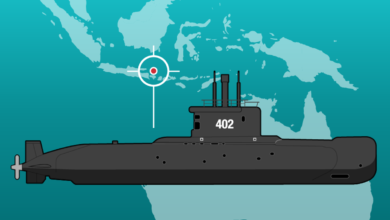WASHINGTON – After months of focusing on the biggest conflict in Europe since WWII, President Joe Biden embarks Thursday on a five-day trip to Asia, turning his attention to the region of the world he had previously hoped to prioritize.
Russia’s invasion of Ukraine won’t be far from mind, however, as Biden visits South Korea and Japan, meeting with leaders of those nations as well as the heads of state from Australia and India.
The trip will be another opportunity for Biden to showcase the global solidarity he’s helped build for Ukraine and to repeat his often-argued case for democracy over authoritarianism.
That message, delivered from the thriving democracies of South Korea and Japan, will be aimed at China, whose growing economic and military prowess makes it – in the view of the administration – the only country capable of seriously disrupting the international system.

In a possible attempt to cause its own disruption, North Korea could launch a missile or nuclear test during Biden's trip to the region.
“We are preparing for all contingencies,” Jake Sullivan, Biden’s national security adviser, said Wednesday.
In addition to reassuring Indo-Pacific allies that his attention has not strayed, Biden will try to strengthen an economic alliance with the region. But the political unpopularity in the U.S. of trade deals has forced the administration to turn to a different type of agreement – and it’s unclear how it will be received.
Still, Biden will have a better combination of leaders in Japan and South Korea to work with than his recent predecessors have had. And he’s traveling on the tailwinds of the unity around Ukraine and a just-completed summit in Washington with Southeast Asian nations.
Here's what to watch for on Biden's first trip as president to Asia:
Refocusing on Asia
Like his predecessors, Biden has tried to make clear the importance of the Indo-Pacific region for U.S. foreign policy.
“This is the most dynamic region of the world. That's where that history of the 21st century is going to be written,” said Brian Harding, a senior expert for Asia for the United States Institute of Peace. “A lot of that has to do with the rise of China and just an intense power dynamic that is really shifting.”
Kurt Campbell, coordinator for Indo-Pacific Affairs on the White House National Security Council, recently acknowledged that past administrations have similarly wanted to focus on the region, only to be drawn away by other challenges.
“There is a deep sense that that can’t happen again,” he said at a recent public event at the United States Institute of Peace.
Also Campbell argued that while the Obama administration mistakenly let its emphasis on Asia be viewed as a pivot away from Europe, the Biden administration is more closely integrating the approaches. Campbell said he spends nearly as much time talking with European partners about various Indo-Pacific initiatives as he does collaborating with Indo-Pacific allies.
Still, there’s a nervousness – especially in Taiwan but also in Japan – about whether the U.S. can handle two major security crises if Asia erupts while Ukraine is still in play, said Michael Green, an Asia expert at the Center for Strategic and International Studies.
US aid to Ukraine could hit $53B:Here's what it covers, how it compares and who pays for it

Leading up to Biden’s trip, the U.S. hosted leaders of Southeast Asian nations to address their economic and security concerns.
“I think you’ll see some statements from the president that go right at that little bit of uncertainty about our ability to – not our intentions, really, but our ability to handle, major challenges in Europe and Asia at the same time,” said Green, who worked on Asian affairs in the George W. Bush administration.
Tomita Koji, Japan’s ambassador to the United States, said Biden’s visit will send the message that the U.S. is not distracted.
“It sends a powerful signal that the United States stays focused on the Indo-Pacific region at the time when people are preoccupied with the situation in Ukraine,” Tomita said at a recent Center for Strategic and International Studies event.
Ukraine still on the agenda
Even though the trip is an attempt to pivot from Ukraine, the war will still be on the agenda. Biden is likely to praise Japan for its support. In a reversal from how Japan reacted when Russia invaded Crimea in 2014, Prime Minister Fumio Kishida was quick to respond to Russia’s move on Ukraine as a challenge to the global order.
Japan is increasingly “standing up more on what I would think of as sort of values issues,” said Zack Cooper, who studies U.S. strategy in Asia at the American Enterprise Institute.
NATO expansion:Finland, Sweden submit NATO membership application, driven by security fears over Russia

Victor Cha, an expert on Korea at the Center for Strategic and International Studies, said he’ll be watching to see how South Korea’s new president, Yoon Suk-yeol, might step up its involvement. While the previous government was “quite slow and late in the process,” Cha said, “Yoon has talked about doing more.”
Harding, at the United States Institute of Peace, said Ukraine will be part of the discussion in part because the war has demonstrated both the fragility of the international system and why Southeast Asia needs to build its own resilience. In addition, he said, any focus on Asia is also an opportunity to highlight China’s tacit approval for Russia’s invasion.
Calling out China on Ukraine is also a way to warn China against taking aggressive action on Taiwan, which China views as part of its territory.
“That will be a big subtext to everything,” said David Shullman, an expert on China with the Atlantic Council think tank.

Aligning against China
In the early days of the administration, Secretary of State Antony Blinken cast the U.S.-China relationship as the “biggest geopolitical test of the 21st century.”
But the U.S. has struggled to develop a China policy, said Scott Kennedy, a China expert at the Center for Strategic and International Affairs. Without a lot that can be negotiated effectively with China, he said, the U.S. has turned to working “as much as we can with allies in Asia, Europe, and elsewhere on building the kind of world that we want and deterring the kind of world that we don’t want.”
China is watching carefully for any cracks in those alliances that it can exploit.
India, for example, has been at most neutral on Ukraine. Prime Minister Narendra Modi will be in Tokyo for a Tuesday meeting of the “Quad” alliance of India, Australia, Japan and the U.S.
Any difficult conversations the United States wants to have with Modi about Ukraine will likely be in private, said Green, the Asia expert at the Center for Strategic and International Studies.
“It appears pretty clear the Biden administration is not looking for trouble with India,” he said.
Watchdog:US troop pullout was key factor in Afghan collapse

Biden is buoyed by the fact that the new South Korean government is more favorable to the U.S. than the one it replaced, and Japan has proven itself a strong partner.
“The stars have aligned with the leaders that they get to engage with now,” Shullman said.
Biden is trying to set up a contrast with how China and other countries operate at home in the Indo-Pacific region, Harding said. But whether that shifts the sense some have in Southeast Asia that China’s rise is inevitable and the United States’ influence is declining is an open question, he added.
North Korea's growing missile threat
Biden wants to strengthen relations in Asia not just because of China, but also to deal with the threat of North Korea’s missile and nuclear programs.
North Korea has test-launched multiple missiles in recent months, including nuclear-capable missiles potentially able to reach South Korea, Japan or the U.S.
According to U.S. intelligence, there’s a “genuine possibility” that North Korea could conduct either a missile or nuclear test around the time of Biden’s visit, Sullivan said Wednesday.
“We are prepared, obviously, to make both short and longer-term adjustments to our military posture as necessary to ensure that we are providing both defense and deterrence to our allies in the region and that we're responding to any North Korean provocation,” he said.
'White supremacy is a poison':Emotional Biden in Buffalo condemns those who push 'perverse' replacement theory

Since Biden took office, the administration hasn’t been able to open the lines of communication with North Korean leader Kim Jong Un.
“We have tried on numerous occasions to reach out to North Korean interlocutors to establish dialogue,” Campbell said last week, adding that the U.S. views North Korea’s recent actions as provocative.
But Campbell noted the new leadership in South Korea, which is expected to take a harder line against its northern neighbor and work more closely with the United States.
“And on that basis, I think we're prepared for any kind of diplomacy or engagement with North Korea,” Campbell said.
Biden will not go to the demilitarize zone between North and South Korea. He will visit American and Korean troops who, Sullivan said, are “standing shoulder to shoulder in defense of our collective security.”
A new model of economic engagement
The United States’ ability to influence the Indo-Pacific region was diminished by its withdrawal from the Trans-Pacific Partnership, a comprehensive trade agreement among 12 Pacific Rim countries. Former President Donald Trump withdrew from the pact, before it was ratified, and declared an end to the era of multinational trade agreements.

Administration officials have acknowledged that the U.S. has previously embraced trade deals that ended up hurting America’s middle class.
“Trade is politically challenging and contentious in the United States,” Campbell said in a public discussion before the U.S. hosted a summit of Southeast Asian nations last week.
Rather than attempting to rejoin the trade deal, the administration is rolling out its “Indo-Pacific Economic Framework” as the centerpiece of Biden’s economic strategy in the region.
The framework will focus on trade, strengthening the supply chain, infrastructure and clean energy issues, and taxes and anti-corruption.
It will be launched in Japan, which welcomes the initiative. Tomita, Japan’s ambassador to the U.S., called America’s withdrawal from the trade partnership a setback and said China is “very aggressively seeking to fill this void."
“We are concerned,” he said. “But at the same time, the (Trans Pacific Partnership) is not the single way to reassert the U.S. leadership in this area.”
Many countries, however, are likely to wonder if the new framework provides enough tangible benefits to offset the fact that they won’t gain greater access to the U.S. market, said Matt Goodman, a global economic expert at the Center for Strategic and International Studies who worked in the Obama administration.
“On the positive side, it is at least something,” Goodman said. “This is a recognition the U.S. has to have a credible and durable economic strategy in the region to complement its security and diplomatic activities out there.”
![North Korea tested out its most advanced missile yet, firing the Hwasong-17 into the sea as part of a full test in late March of 2022. The missile stayed airborne for over an hour, flying nearly 700 miles and precisely striking a target. This latest test demonstrates that the rogue nation is closer than ever […]](https://cdn.cincylink.com/pub/content/uploads/sites/27/2022/05/1652946304_738_Biden-heads-to-South-Korea-Japan-on-first-presidential-trip.jpg)
Source link








